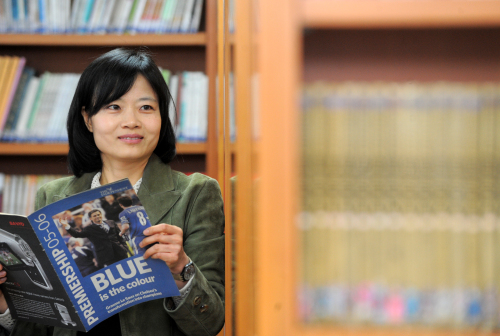English instructor uses sports to motivate and encourage learningAthletic performance and academic motivation for Korean student athletes are often thought to be in inverse proportion to one another.
But Hwang Sung-ah, an English instructor at a middle school attached to Dongguk University, has proven that perception wrong by getting the school soccer team eager to learn the language.
In Korean schools, student athletes tend not to show as much academic zeal as athletic passion as they are often absent from regular classes to train or compete. The soccer team at Middle School Attached to College of Education Dongguk University had been no exception before Hwang began teaching them.
When she first encountered them, many of the players’ inability to recite the English alphabet or spell English words came as no surprise.
Hwang teamed up with the coach to encourage players to try to get higher grades and better test scores. She was convinced that it would help improve their athletic performance.

Hwang Sung-ah, English instructor for Dongguk University Middle School’s soccer team, with her teaching materials at the school library. (Ahn Hoon/The Korea Herald)
A 40-year-old English speaking instructor, who earned her master’s degree in linguistics and TESOL from University of Surrey in England, Hwang found her teaching niche in combining athletic and academic eligibility. When she first came to the school, she was asked what sort of students she wanted to teach, and answered without hesitation, “the soccer team.”
Hwang provided her own teaching materials to keep them interested in learning English. They included football related children’s books and video clips featuring Park Ji-sung of Manchester United.
All her work seemed to pay off when her students started to pick up words from the soccer broadcasts.
“When they were listening to the game broadcasts, they could understand some of the words I taught them in class,” Hwang said.
Hwang had a sports-aficionado father as a child. While she was studying in England, she would, in her leisure time, tune in to the BBC to watch the premier league, and soon became a soccer buff herself.
She focused her lessons for her students on soccer terms. Soon, spelling out words like “transfer,” “MVP,” “squad” and “subs,” were no problem for her students.
“Many think young athletes are distracted by nature and have a hard time concentrating, but I can tell you that they are wrong. Student athletes have clearer goals in life compared with their friends. They are smart and, as a matter of fact, they do way better in concentration. No one in the same age group can outperform them for enthusiasm,” said Hwang.
Her dedication didn’t end there. During the World Cup Hwang gave up watching the game on TV just to go out and watch her students play in local competitions.
“I told them that I was happier watching the future mini-world cup,” she said.
Her students say that she is more than an English teacher. They call her “dad” and “uncle,” to whom they empty out their personal problems.
This year, six of the players who were taught by Hwang entered a vocational high school, where all of them chose “business English” as a major.
“I was extremely thrilled to hear that,” she said.
In 2007, right before she came to the school, she taught English to the national under-17 soccer team in Paju, Gyeonggi Province. Her teaching experience there opened her eyes to educational matters on student athletes. She decided to roll up her sleeves to help them solve their academic problems one step at a time. “I found that several high school level pro footballers didn’t even know the English alphabet,” she said.
“I told midfielder Yoon Bitgaram, defender Yoon Suk-young and other players that if they did not feel the thrill and some sort of achievement through study, then it is less likely that they feel the thrill from winning a soccer match. I always emphasized the importance of academic abilities. I told them to never let an academic chance slip through,” she added.
She is positive about the outlook for school curricula for student athletes. “The current Korean curriculum, where athletic and academic areas are separated, can’t be addressed immediately, however, we will eventually find the right blend. We’re just in a transition period,” she said.
Hwang will resume her football English class Monday, which will mark her fourth semester at the school.
“I thought I was going to go into researching, or get my Ph.D. after working as a temporary English instructor here, but I guess I’m staying, I don’t want to be doing anything else.
“I feel rewarded by teaching student athletes.”
By Hwang Jurie (
jurie777@heraldcorp.com)






